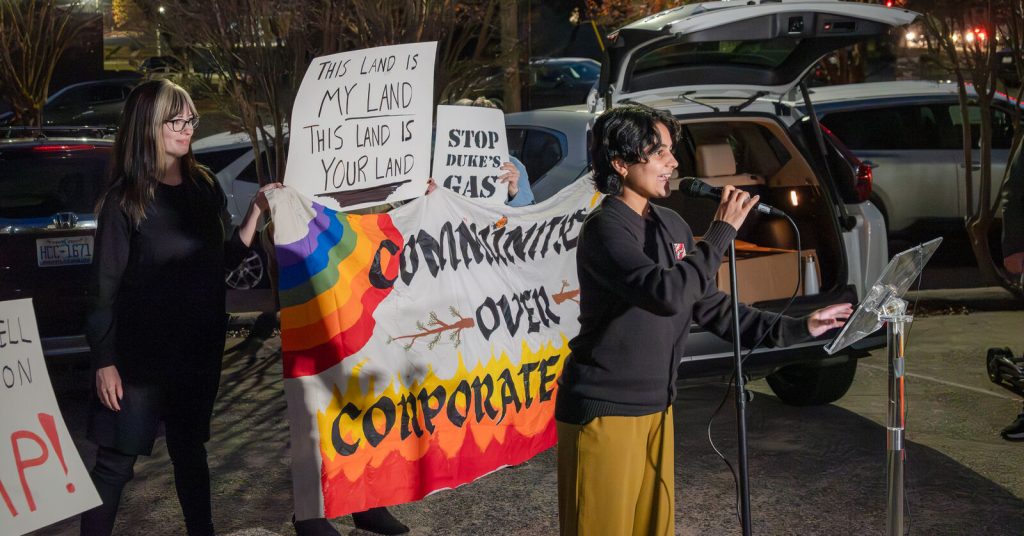News Briefs
Twelve arrested in protest over Marsh Fork elementary school
State police arrested 12 demonstrators at the West Virginia state capitol during a peaceful protest over conditions at Marsh Fork elementary school on March 16.
Holding signs asking “What would Jesus do?” and “Build a New School,” demonstrators demanded that WV Gov. Joe Manchin build the school in a safer location. The demonstrators were asked to move by state police but refused. “Marsh Fork elementary is a very clear example of energy injustice that is happening globally,” said Hillary Hosta, a demonstrator who was also arrested. The arrest video is available through YouTube (look up Marsh Fork). The major issue is the safety of an elementary school which sits literally a few hundred yards downstream of a 2.8 billion gallon coal sludge impoundment.
“They’re running an illegal impoundment down there with our children sitting underneath it,” said Ed Wiley before his arrest. The impoundment has many MSHA violations, he said. “This thing will fall and people … will perish,” he warned.
Judge blocks MTR mining permits
In a victory for opponents of mountaintop removal mining, federal judge Robert C. Chambers rescinded environmental permits for four Massey Coal Company mountaintop removal mines this March. The ruling is likely to impact other applications for expanded MTR mining, but will not stop existing operations.
Chambers said the Corps of Engineers “failed to properly assess the cumulative effects (of MTR mining techniques)” as required by environmental law. The Corps “acted in an arbitrary and capricious manner,” he said.
Massey said it would immediately lay off 111 miners and questioned whether dumping more debris could cause more harm. “The streams in question have been filled; their functions lost,” Massey wrote. “There is no harm to the stream from placing more rock on top of the rock that has already filled the stream.”
Plaintiffs in the case included the Ohio Valley Environmental Coalition (“OVEC”), Coal River Mountain Watch, and West Virginia Highlands Conservancy.
It was unclear what long term effect the ruling would have, as similar rulings have been overturned at the appeals level. Joe Lovett, an attorney who worked on the case with the Appalachian Center for the Economy and the Environment, said the decision would be harder to overturn than previous decisions against mountaintop removal mining. “Mining methods are going to have to change here,” Lovett told reporters.
Consolidated coal begins dumping mine waste into Levisa river
A Virginia coal company began dumping salty mine wastewater into the Levisa River this April despite protests from Kentucky residents who live downstream. Officials in Kentucky said they were worried about drinking water supplies.
Cosolidated Coal Co.’s disposal of acidified, salty mine water has raised serious concerns about impacts on the river’s ecosystem. The water is being drained from one of the company’s mines and must be dumped somewhere in order to keep the mine open, company officials said.
Biologists are unsure about the effect of dumping an estimated 14 million gallons of waste water per day. “No one knows how far the toxic zone will continue in the river,” said Virginia Tech professor Don Orth. Kentucky assistant Attorney General Pierce Whites said “we think this is a danger to Kentucky’s waterways.”
Virginia resident Wade McNeely, who has been outspoken in opposition to the plan, said there were estimates of up to a million pounds of salt per year being introduced in the system and additional contaminants in the water.
“Just how much more can we live with?” McNeely asked. “We live in an area where the cancer rate is one of the highest in America.”
Governors agree on natural preservation
Governors of Virginia, West Virginia, Maryland and Pennsylvania signed a Highlands Action Program charter this month seeking “to preserve the ecological and cultural resources” of the Mid-Atlantic Appalachian Highlands.
“The Appalachian Highlands region is a unique area, both from a cultural and ecological standpoint. It has species and landscapes found nowhere else in the world,” Virginia Governor Timothy Kaine said.
“In the Appalachian Mountains of West Virginia, people have always had a direct connection to the natural resources around them,” WV Governor Joe Manchin said. “We understand that job creation and long-term economic stability go hand-in-hand with improving and maintaining our rich natural and cultural resources. ”
Related Articles
Latest News

Leave a comment
Your email address will not be published. Required fields are marked *





Leave a Comment